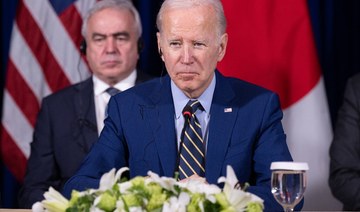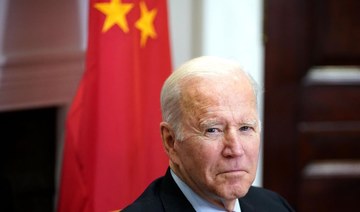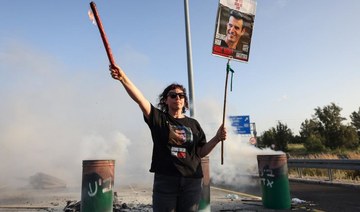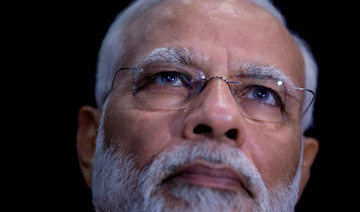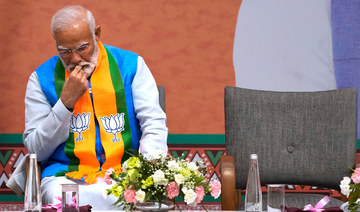NUSA DUA, Indonesia: President Joe Biden objected directly to China’s “coercive and increasingly aggressive actions” toward Taiwan during the first in-person meeting of his presidency with Xi Jinping, as the two superpower leaders aimed on Monday to “manage” their differences in the competition for global influence.
The nearly three-hour meeting was the highlight of Biden’s weeklong, round-the-world trip to the Middle East and Asia, and came at a critical juncture for the two countries amid increasing economic and security tensions. Speaking at a news conference afterward, Biden said that when it comes to China, the US would “compete vigorously, but I’m not looking for conflict.”
He added: “I absolutely believe there need not be a new Cold War” between America and the rising Asian power.
Biden reiterated US support for its longstanding “One China” policy, which recognizes the government in Beijing — while allowing for informal American relations and defense ties with Taipei, and “strategic ambiguity” over whether the US would respond militarily if the island were attacked. He also said that despite China’s recent saber rattling, he does not believe “there’s any imminent attempt on the part of China to invade Taiwan.”
Xi, according to the Chinese government’s account of the meeting, “stressed that the Taiwan question is at the very core of China’s core interests, the bedrock of the political foundation of China-US relations, and the first red line that must not be crossed in China-US relations.”
Biden said he and Xi also discussed Russia’s aggression against Ukraine and “reaffirmed our shared belief” that the use or even the threat of nuclear weapons is “totally unacceptable.” That was a reference to Moscow’s thinly veiled threats to use atomic weapons as its nearly nine-month invasion of Ukraine has faltered.
Chinese officials have largely refrained from public criticism of Russia’s war, although Beijing has avoided direct support of the Russians, such as supplying arms.
While there were no watershed breakthroughs, the Biden-Xi meeting brought each side long-sought, if modest, gains. In addition to the shared condemnation of Russian nuclear threats, Biden appeared to secure from Xi the resumption of lower-level cooperation from China on a range of shared global challenges. Meanwhile, Xi, who has aimed to establish China as a geopolitical peer of the US, got symbolic home turf for the meeting as well as Biden’s forceful One China policy commitment.
The White House said Biden and Xi agreed to “empower key senior officials” to work on areas of potential cooperation, including tackling climate change and maintaining global financial, health and food stability. Beijing had cut off such contacts with the US in protest of House Speaker Nancy Pelosi’s trip to Taiwan in August.
China and the US are the world’s worst climate polluters, and their one-on-one climate contacts are seen as vital to staving off some of the most dire scenarios of climate change. Biden’s first stop on his long overseas trip was in Egypt for a major climate conference.
The two leaders agreed to have US Secretary of State Antony Blinken travel to Beijing to continue discussions.
Xi and Biden warmly greeted each other with a handshake at a luxury resort hotel in Indonesia, where they are attending the Group of 20 summit of large economies.
“As the leaders of our two nations, we share responsibility, in my view, to show that China and the United States can manage our differences, prevent competition from becoming anything ever near conflict, and to find ways to work together on urgent global issues that require our mutual cooperation,” Biden said to open the meeting.
Xi called on Biden to “chart the right course” and “elevate the relationship” between China and the US He said he wanted a “candid and in-depth exchange of views.”
Both men entered the highly anticipated meeting with bolstered political standing at home. Democrats triumphantly held onto control of the US Senate, with a chance to boost their ranks by one in a runoff election in Georgia next month, while Xi was awarded a third five-year term in October by the Communist Party’s national congress, a break with tradition.
But relations between the two powers have grown more strained under successive American administrations, with economic, trade, human rights and security differences at the fore.
As president, Biden has repeatedly taken China to task for human rights abuses against the Uyghur people and other ethnic minorities, crackdowns on democracy activists in Hong Kong, coercive trade practices, military provocations against self-ruled Taiwan and differences over Russia and Ukraine.
The White House said Biden specifically mentioned US concerns about China’s actions in Xinjiang, Tibet, and Hong Kong, and the plight of Americans it considers “wrongfully detained” or subject to exit bans in China.
Taiwan has emerged as one of the most contentious issues. Multiple times in his presidency, Biden has said the US would defend the island — which China has eyed for eventual unification — in case of a Beijing-led invasion. But administration officials have stressed each time that the US China policy has not changed.
Pelosi’s trip prompted China, officially the People’s Republic of China, to retaliate with military drills and the firing of ballistic missiles into nearby waters.
The White House said Biden “raised US objections to the PRC’s coercive and increasingly aggressive actions toward Taiwan, which undermine peace and stability across the Taiwan Strait and in the broader region, and jeopardize global prosperity.”
In the meeting, Biden said China’s economic practices “harm American workers and families, and workers and families around the world,” the White House said.
The meeting came just weeks after the Biden administration blocked exports of advanced computer chips to China — a national security move that bolsters US competition against Beijing.
Xi’s government said he condemned such moves, saying, “Starting a trade war or a technology war, building walls and barriers, and pushing for decoupling and severing supply chains run counter to the principles of market economy and undermine international trade rules.”
Although the two men have held five phone or video calls during Biden’s presidency, White House officials said those encounters were no substitute for an in-person meeting. They said sitting down with Xi was all the more important after the Chinese leader strengthened his grip on power with a third term and because lower-level Chinese officials have been unable or unwilling to speak for their leader.
White House officials and their Chinese counterparts spent weeks negotiating details of the meeting, which was held at Xi’s hotel with translators providing simultaneous interpretation through headsets. Each leader was flanked by nine N-95 mask-wearing aides, and in the case of Xi, at least one official newly elevated in the recent Congress to its top leadership.
US officials were eager to see how Xi approached the meeting after consolidating his position as the unquestioned leader of the state — whether that made him more or less likely to seek out areas of cooperation.
Biden said Xi was as he’s always been.
“I didn’t find him more confrontational or more conciliatory,” Biden said. “I found him the way he’s always been, direct and straightforward.”
Biden, Xi clash on Taiwan but try to ‘manage’ differences
https://arab.news/bbs47
Biden, Xi clash on Taiwan but try to ‘manage’ differences
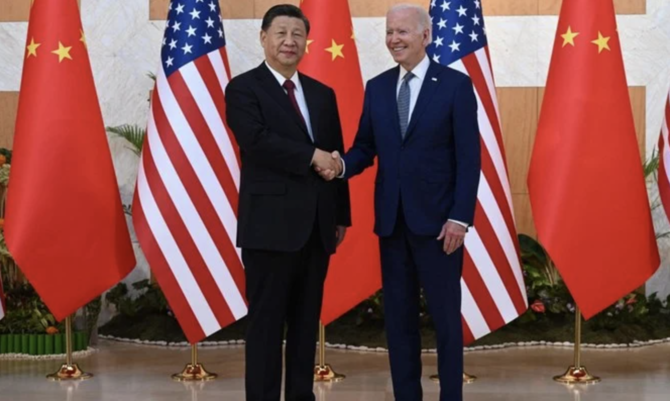
- Both leaders stress the need to manage differences and avoid conflict
US campus protests wane after crackdowns, Biden rebuke
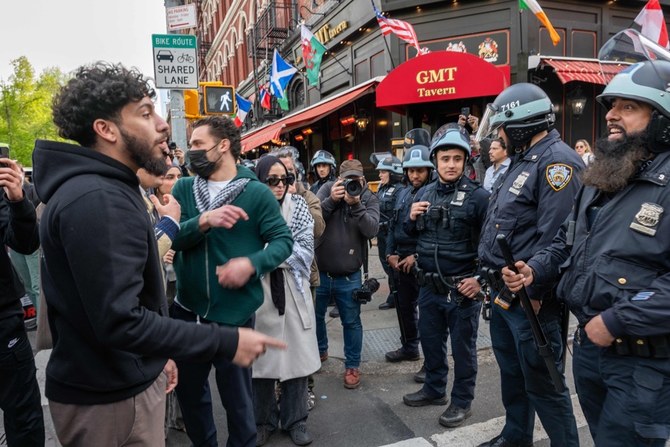
NEW YORK: Pro-Palestinian protests that have rocked US campuses for weeks were more muted Friday after a series of clashes with police, mass arrests and a stern White House directive to restore order.
Police in Manhattan cleared an encampment at New York University after sunrise, with video posted to social media by an official showing protesters exiting their tents and dispersing when ordered to do so.
The scene appeared relatively calm compared to crackdowns at other campuses around the country — and some worldwide — where protests over Israel’s war against Hamas in Gaza have multiplied in recent weeks.
University administrators, who have tried to balance the right to protest and complaints of violence and hate speech, have increasingly called on police to clear out the demonstrators ahead of year-end exams and graduation ceremonies.
At the University of Chicago, law enforcement appeared set to dismantle an encampment Friday after the school’s president said talks with protesters on a compromise had failed.
Before the clearing operation began, dozens of American flag-wielding counter-protesters showed up and confronted the pro-Palestinian group, but police separated the two sides, local media reported.
More than 2,000 arrests have been made in the past two weeks across the United States, some during violent confrontations with police, giving rise to accusations of use of excessive force.
President Joe Biden, who has faced pressure from all political sides over the conflict in Gaza, gave his first expansive remarks on the protests Thursday, saying that “order must prevail.”
“We are not an authoritarian nation where we silence people or squash dissent,” Biden said in a brief address from the White House.
“But neither are we a lawless country. We’re a civil society, and order must prevail.”
His remarks came hours after police moved in on demonstrators at the University of California, Los Angeles, which had seen a violent confrontation when counter-protesters attacked a fortified encampment there.
A large police contingent forcibly cleared the sprawling encampment early Thursday while flashbangs were launched to disperse crowds gathered outside.
Schools officials said that more than 200 people were arrested.
On the US East coast Thursday, protesters at New Jersey’s Rutgers University agreed to take down their camp after reaching a compromise with administrators — a similar deal to one made at Brown University in Rhode Island.
Republicans have accused Biden of being soft on what they say is anti-Semitic sentiment among the protesters, while he faces opposition in his own party for his strong support for Israel’s military offensive.
“There should be no place on any campus, no place in America for anti-Semitism, or threats of violence against Jewish students,” Biden said.
Education Secretary Miguel Cardona echoed the condemnation in a letter to university leaders on Friday, pledging to investigate reports of anti-Semitism “aggressively,” CNN reported.
Meanwhile, similar student protests have popped up in countries around the world, including in Australia, France, Mexico and Canada.
In Paris, police moved in to clear students staging a sit-in at the Sciences Po university.
An encampment has grown at Canada’s prestigious McGill University, where administrators on Wednesday demanded it be taken down “without delay.”
However, police had yet to take action against the site as of Friday.
The Gaza war started when Hamas militants staged an unprecedented attack on Israel on October 7 that resulted in the deaths of more than 1,170 people, mostly civilians, according to an AFP tally of Israeli official figures.
Israel estimates that 128 hostages remain in Gaza. The Israeli military says 35 of them are dead.
Israel’s retaliatory offensive has killed more than 34,600 people in Gaza, mostly women and children, according to the Hamas-run territory’s health ministry.
Biden to host Jordan king next week amid Gaza talks

- Hamas accused Israeli Prime Minister Benjamin Netanyahu on Friday of trying to derail the proposed Gaza deal with his threats to launch an operation in Rafah
- Israel has killed more than 34,000 Palestinians in Gaza, mostly women and children, according to the health ministry in the Hamas-run territory
WASHINGTON: US President Joe Biden will host Jordan’s King Abdullah II next week, the White House said Friday, as negotiations continue in the Middle East for a ceasefire in Gaza.
The meeting will be “private” and will be followed by a readout, White House Press Secretary Karine Jean-Pierre told reporters, without giving a date for the encounter.
The meeting comes against the backdrop of talks for a deal to release hostages and secure a ceasefire between Israel and Hamas in Gaza after nearly seven months of war.
The talks, which come after months of efforts by mediators Egypt, Qatar and the United States to broker a new agreement between the combatants, are at a critical juncture.
The United States has urged the Palestinian militant group to accept the “extraordinarily generous” offer.
But Hamas accused Israeli Prime Minister Benjamin Netanyahu on Friday of trying to derail the proposed Gaza deal with his threats to launch an operation in Rafah.
King Abdullah II last visited the White House in February when he called for an immediate ceasefire and warned an attack on Rafah would cause a “humanitarian catastrophe.”
In April, Jordan worked alongside the United States and other allies to shoot down Iranian drones that Tehran sent toward Israel, with the kingdom keen to avoid a wider conflict.
Austin: No indication Hamas planning attack on US troops

- Israel has killed more than 34,000 Palestinians, according to Gaza’s Health Ministry
WASHINGTON: US Defense Secretary Lloyd Austin said he did not see any indication Hamas was planning any attack on US troops in Gaza but added adequate measures were being put in place for the safety of military personnel.
“I don’t discuss intelligence information at the podium. But I don’t see any indications currently that there is an active intent to do that,” Austin said during a press briefing.
“Having said that ... this is a combat zone and a number of things can happen, and a number of things will happen.”
Austin’s remarks came as the US military said it was temporarily pausing the offshore construction of a maritime pier because of weather conditions and instead would continue building it at the Israeli Port of Ashdod.
FASTFACT
The US military says it is temporarily pausing the offshore construction of a maritime pier because of weather conditions.
The maritime pier, once built, will be placed off the coast of Gaza in a bid to speed the flow of humanitarian aid into the enclave.
“Forecasted high winds and high sea swells caused unsafe conditions for soldiers working on the surface of the partially constructed pier,” the US military said in a statement.
“The partially built pier and military vessels involved in its construction have moved to the Port of Ashdod, where assembly will continue,” it added.
Earlier this week, the Pentagon said about 50 percent of the pier had been constructed.
Israel has sought to demonstrate it is not blocking aid to Gaza, especially since President Joe Biden issued a stark warning to Prime Minister Benjamin Netanyahu, saying Washington’s policy could shift if Israel fails to take steps to address civilian harm, humanitarian suffering, and the safety of aid workers.
US officials and aid groups say some progress has been made but warn it is insufficient, amid stark warnings of imminent famine among Gaza’s 2.3 million people.
The humanitarian situation in Gaza — which has been devastated by more than six months of Israeli operations against Hamas — remains dire, with a senior US administration official saying last week that the territory’s entire population of 2.2 million people is facing food insecurity.
Canada police charge three with murder of Sikh leader Nijjar

- Nijjar was a Canadian citizen campaigning for the creation of Khalistan, an independent Sikh homeland
OTTAWA: Canadian police said on Friday they had arrested and charged three Indian nationals with the murder of Sikh separatist leader Hardeep Singh Nijjar in June 2023 and said they were probing possible links to the Indian government.
Nijjar, 45, was shot dead outside a Sikh temple in Surrey, a Vancouver suburb with a large Sikh population. Canadian Prime Minister Justin Trudeau has cited evidence of Indian government involvement, prompting a diplomatic crisis with New Delhi.
Assistant Commissioner David Teboul said the matter was still under investigation and other probes were being carried out. These “include investigating connections to the government of India,” he told a televised news conference.
Nijjar was a Canadian citizen campaigning for the creation of Khalistan, an independent Sikh homeland carved out of India. The presence of Sikh separatist groups in Canada has long frustrated New Delhi, which had labeled Nijjar a “terrorist.”
Last week the White House expressed concern about the reported role of the Indian intelligence service in assassination plots in Canada and the United States.
India’s Rahul Gandhi to contest elections from family borough

- Gandhi contests polls from second seat in family bastion
- Emotional moment to contest from Raebareli, Gandhi says
NEW DELHI: Indian opposition leader Rahul Gandhi will contest the general election from the family bastion in the north, his Congress Party announced on Friday, a move that will challenge Prime Minister Narendra Modi in a region he dominates.
Gandhi, the scion of the Nehru-Gandhi dynasty, will contest from Raebareli in politically crucial Uttar Pradesh state, Congress said, in addition to Wayanad in Kerala state in the south, which has already voted. India allows candidates to contest multiple constituencies but they can represent only one.
Uttar Pradesh is India’s most populous state and elects 80 lawmakers to the lower house of parliament, the most of any state. In the last election in 2019, Modi’s Bharatiya Janata Party and allies won 64 seats, including from Amethi, adjacent to Raebareli, where Gandhi was defeated.
His return to the area, albeit for a second constituency, will invigorate the party, Congress officials said.
Gandhi said being nominated from Raebareli was an “emotional moment” for him.
“My mother has entrusted me with the responsibility ... with great confidence and given me the opportunity to serve it,” he posted on X.
“In the ongoing battle for justice and against injustice, I seek the love and blessings of my loved ones. I am confident that all of you are standing with me in this battle to save the constitution and democracy,” he said.
Gandhi’s mother Sonia won from Raebareli in 2019, which has returned a Congress candidate in 17 of the 20 elections held there since 1952, mostly members of the Gandhi family. Sonia Gandhi is now a member of the upper house of parliament.
Modi is widely expected to win a rare third term in the general election that got underway on April 19 and concludes on June 1, with votes set to be counted on June 4.
However, analysts say a low voter turnout in the first two phases of the seven-phase election has dampened hopes of a huge majority for the party, although they said the BJP was still likely to retain power in the world’s most populous nation.
Soon after the announcement, Gandhi flew to Raebareli in a private aircraft, accompanied by his mother Sonia, sister Priyanka and senior Congress leaders, and filed his nomination papers.
Modi and the BJP attacked Gandhi for the decision.
“I had said that the prince will lose in Wayanad and in fear of his loss ... he will look for another seat,” Modi said on Friday, referring to Gandhi.
“I also want to tell them wholeheartedly, do not be afraid, do not run away,” Modi said.
Congress has ruled India for 54 of its 76 years since independence from Britain, and members of the Nehru-Gandhi family were prime ministers for more than 37 of those 54 years.
However, the party has floundered since it was swept out of power by Modi in 2014 and has been struggling to revive itself.
Gandhi contesting from Raebareli is good news for the opposition INDIA alliance of 27 parties that Congress leads, said Rasheed Kidwai, political analyst and visiting fellow at New Delhi’s Observer Research Foundation.
“The significance of Rahul contesting here is that it will boost the alliance with Samajwadi Party,” Kidwai said referring to the regional partner of Congress in Uttar Pradesh. “The opposition story is not all that bad and this will force a contest with BJP.”



